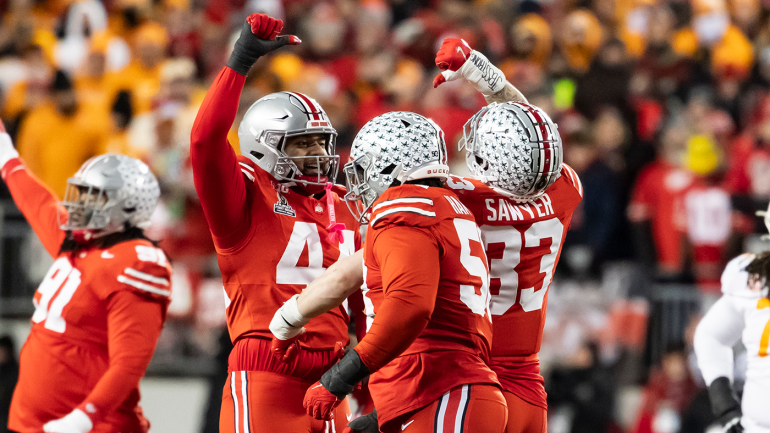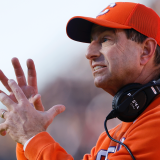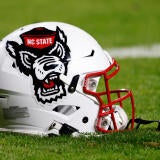Reseeding the College Football Playoff bracket: Ohio State moves to No. 2 seed entering quarterfinals
The Buckeyes tick up in the CFP field after the blowout win over Tennessee in the first round

It was straight chalk for the favorites in the first round of the College Football Playoff, but that still led to drastic changes as we reseed the teams still remaining in the field. But first, a problem that needs to be solved.
Fandom is strangely hyper focused on the lopsided results in the CFP's first round with games decided by an average of 19.3 points. Even worse, the tone is tainted by casualness — and fans showing their lack of awareness around the product. Where were you when Georgia won the national title after it blew out TCU by 58 points, the largest win ever in a bowl game? Stringing up sacrificial lambs is nothing new in college football. Semifinal games during the first 10 years of the CFP were decided by an average of 17.9 points. The national champion has won the title by at least 15 points the last six years.
You're asking, "Is this what we want college football to be?" That's not a question worth answering. After all, if you've been paying attention, it has always been this way.
The issue is the system and the clunky gears forced awkwardly into the machine by college football's half-blind watchmakers.
In the end, the 12-team field is down to the eight best teams, though that is debatable because of the convoluted format. Rewarding the four highest-ranked conference champions with a first-round bye led to wider scoring margins in the first iteration of this 12-team CFP. Debate it if you want, it's a hypothetical discussion based on little empirical evidence, but it's still a viable issue that needs attention.
In January, we expect the CFP's board of directors will discuss tweaks, including selection criteria and byes. If they do, we'll look back and wonder if matchups like No. 10 seed SMU at No. 7 seed Tennessee or No. 9 seed Boise State at No. 8 seed Indiana would have provided more competitive matchups than Penn State -- which would have received a bye without automatic qualifiers -- choking out SMU in Happy Valley.
Eliminating the automatic byes for conference champs is a simple tweak that should be considered and would likely improve competition. The problem is every decision maker in the sport cares more about their silos than the health of the game. If you don't believe me, just look at how much has changed over the last five years.
This reseeding exercise is much more reactionary, so we had some big moves as we enter the quarterfinal round. Let's have a look at how the teams stack up and dive into the hypothetical matchups.
| 1 | |
| Oregon is undefeated and has the nation's best resume, but the Ducks also have the most difficult road to the national championship. Life's not fair, friends. Up first is a much-anticipated rematch in the quarterfinals with Ohio State in the Rose Bowl; the Ducks defeated the Buckeyes 32-31 in an instant classic in October. Oregon owns two top-five wins, the nation's longest winning streak (14) and arguably the most consistent -- and most experienced -- quarterback (Dillon Gabriel) in the field. | |
| 2 | |
| We'll admit it: Ohio State's dramatic jump in the rankings is more about "eye test" than strength of schedule or record. We're not the CFP Selection Committee, so we'll admit our faults and biases that sometimes go against the "data points." That loss to Michigan was abysmal in November, but the Buckeyes again looked the part of possibly being the best team in the country during the 42-17 blowout of Tennessee in the first round. Perhaps the pressure is off Ryan Day's shoulders after he picked up his second CFP win. Saturday, he was more aggressive with his decisions and approach, but we'll see if he keeps that mindset at the Rose Bowl. It's a shame the quarterfinals will feature the CFP's two best teams, but that's the luck of the draw thanks to Ohio State's incredulous loss to the unranked Wolverines in the regular-season finale. | |
| 3 | |
| Quarterback Carson Beck is reportedly out for the quarterfinal showdown with Notre Dame at the Sugar Bowl. Much like the committee penalized Florida State when it lost Jordan Travis, we're doing the same with the Bulldogs, though their drop is not as steep. Georgia has been strangely inconsistent on defense at times this season, but Kirby Smart always has them ready for the big games, and we know how good he is when given an extra week to prepare for an opponent. Gunner Stockton just can't make many mistakes against the most opportunistic team remaining in the CFP (Notre Dame owns a plus-16 turnover margin). | |
| 4 | |
| Notre Dame smothered Indiana in the first round, continuing its fierce dominance since that Week 2 loss to Northern Illinois. Riley Leonard broke the school record with his 15th rushing touchdown at quarterback, but the key to the Irish's success is running back Jeremiyah Love. He has scored on the ground in every game this season and broke off a 98-yard touchdown run against the Hoosiers. That defense is tremendous, too, forcing turnovers with ease. | |
| 5 | |
| Texas could be the best team in the CFP, but Steve Sarkisian put the Longhorns in some unfortunate situations in the second half against Clemson by abandoning the run. We've said it before and we'll say it again: The Longhorns are at their best when they focus on giving the ball to Jaydon Blue and Quintrevion Wisner. The duo combined for 256 of Texas' season-high 292 rushing yards Saturday. That defense, especially in the trenches, will be the difference in the postseason. The Horns were plus-216 yards rushing against the Tigers. | |
| 6 | |
| Penn State returned two interceptions for touchdowns and cruised at home against SMU. The defense outscored the Mustangs' offense 14-10 in a downright embarrassing performance by SMU, which struggled with Kevin Jennings' mistake-ridden arm. We love the Nittany Lions' postseason push that included gutsy road wins at USC and Minnesota and the never-back-down attitude when trailing Oregon by double digits in the Big Ten Championship Game. James Franklin's crew has prevailed in difficult situations, something that has been missing from previous teams during his tenure. The Nittany Lions hit 12 wins for the first time since 1994. | |
| 7 | |
| Texas is in for an interesting matchup against Arizona State in the Peach Bowl. The Sun Devils are on fire heading into the playoff with a six-game winning streak. They drilled Iowa State 45-19 in the Big 12 title game despite playing without leading receiver Jordyn Tyson and snagged a playoff berth as well as a first-round bye as the No. 4 seed. A high-powered offense is always a concern, particularly one led by a bulldozer at running back like Cam Skattebo, who is only the eighth player in FBS history to record 1,500 rushing yards and 500 receiving yards in a single season. Guts and creativity is Kenny Dillingham's identity as a coach, which has given the Sun Devils more confidence and an edge needed to succeed in the CFP. | |
| 8 | |
| Boise State and Arizona State both own two top-25 wins, but the Broncos' wins were against the same team (UNLV), so ASU gets the slight edge in the reseeding with the help of a stronger strength of schedule and a more impressive performance against top-20 Iowa State. Ashton Jeanty has been an incredible story, and though reliable, it's clear the Broncos would probably not be a playoff-worthy team without him. The pass defense is among the nation's worst (109th). Still, what an incredible draw as the No. 4 seed Penn State in the Fiesta Bowl, where magical things happen for the Broncos. | |
(8) Boise State vs. (1) Oregon: Ashton Jeanty facing off against Oregon's impressive defensive line in a massive rematch from Week 2? Yes, please. The Heisman Trophy runner-up rushed for 192 yards and averaged nearly 8 yards per carry in the 37-34 road loss earlier this season.
(7) Arizona State vs. (2) Ohio State: This is a massive mismatch. Ohio State's offensive line had an easy time dealing with Tennessee's elite defense front, and the Buckeyes' receivers would have a sizable advantage against the Sun Devils' secondary, which has allowed 115 (!) passes of 10-plus yards to rank 103rd nationally. Cam Skattebo would have to go off with a 200-plus yard performance to give ASU a chance at the upset.
(6) Penn State vs. (3) Georgia: Don't these two seem similar? Penn State leans on the running game and tight ends with a solid quarterback as the ball handler; Georgia is now leaning on its backup quarterback and a strong defense, particularly in the middle, to win tight games. I'm not sure who to pick here, but let's give the slight edge to the Bulldogs because of their big-game experience.
(5) Texas vs. (4) Notre Dame: Notre Dame beats teams with ease, but this would be its first top-10 opponent of the season. Texas has many more weapons than any opponent Notre Dame has faced this season. Also, Texas' defensive line has been tremendous and seemingly maintained their otherworldly success from last season despite losing two generational tackles. How Texas defends Riley Leonard, who could be the game-changer, is the key. Plus, can Quinn Ewers take advantage of Notre Dame on the edges? Indiana struggled to do just that in the first round. This might be the best matchup in the reseeded bracket.


























